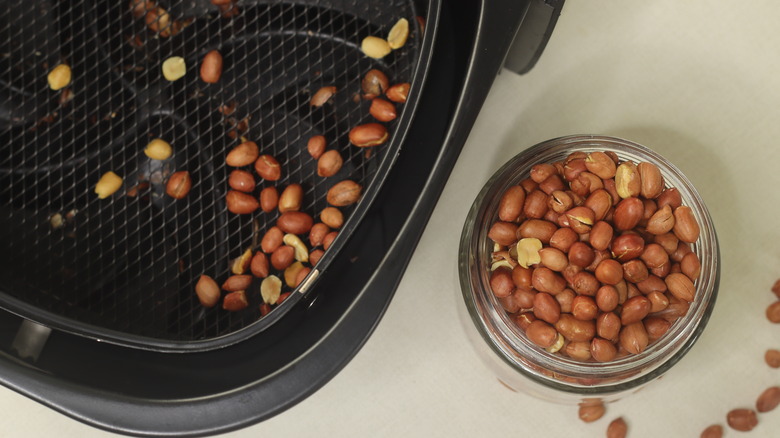How A Clinical Trial Shows Promising News For Children With Peanut Allergies
Many of us are suckers for peanut-containing food products, whether that be in the form of peanut butter on your PB&J sandwich or everyone's favorite Reese's Peanut Butter Cups. There are many children, however, who are unable to enjoy these foods because they have a peanut allergy. You've probably met one of these children, as peanut allergies are extremely common, affecting 2.5 percent of all children in the United States, according to the Children's Hospital of Philadelphia. One might wonder why a child would have an allergy to peanuts. The allergy happens when the body misinterprets the peanut as a threat, releasing histamine in response, which can cause symptoms of an allergic reaction.
The American College of Allergy, Asthma, & Immunology describes several symptoms a child may experience after being exposed to peanuts, including vomiting, diarrhea, pale or blue skin, tightness in the throat, dizziness, and a weak pulse. These allergic reactions can be life-threatening for a child and this is why many schools have a "nut-free" policy. Luckily, 20 percent of individuals with a peanut allergy will grow out of it eventually.
Although allergists recommend that children with a peanut allergy stay away from peanuts, oral immunotherapy treatments have been experimented with to desensitize children to peanuts in order to decrease their risk of experiencing a severe allergic reaction (per Mayo Clinic). A recent clinical trial tested out a new form of oral immunotherapy for peanut allergies, and the results were promising.
Can boiled and roasted peanuts help children with peanut allergies?
In a 2023 study published in Clinical & Experimental Allergy, researchers gave 70 children with peanut allergies subsequent doses of 12-hour boiled peanuts for 12 weeks and 2-hour boiled peanuts for 20 weeks. Additionally, they gave the children roasted peanuts for 20 weeks, eventually giving them 12 roasted peanuts per day. They hoped to reduce the likelihood of severe allergic reactions by desensitizing the children to peanuts.
According to researchers, the results indicated that the majority of participants were successfully desensitized to peanuts. As Luke Grzeskowiak, Ph.D., study author and associate professor in the College of Medicine and Public Health at Flinders University in Adelaide, Australia, told Healthline, "The biggest takeaway from the study is that using boiled followed by roasted peanut oral immunotherapy in peanut-allergic children appeared effective for inducing desensitization in 80% of study participants and was associated with a favorable safety profile, with only 4% of participants experiencing severe allergic reactions during treatment."
Why might boiled peanuts reduce the risk of severe allergic reactions in some children? Boiling peanuts alters the properties within the nut that cause allergies, which may help children develop a higher tolerance to eating peanuts. In addition, it was important that the boiled peanuts were consumed before the roasted peanuts, as boiled peanuts are less allergenic.
Despite the hopeful results of this study, experts recommend that children with peanut allergies avoid peanuts, and seek advice about potential treatment options from a physician.


